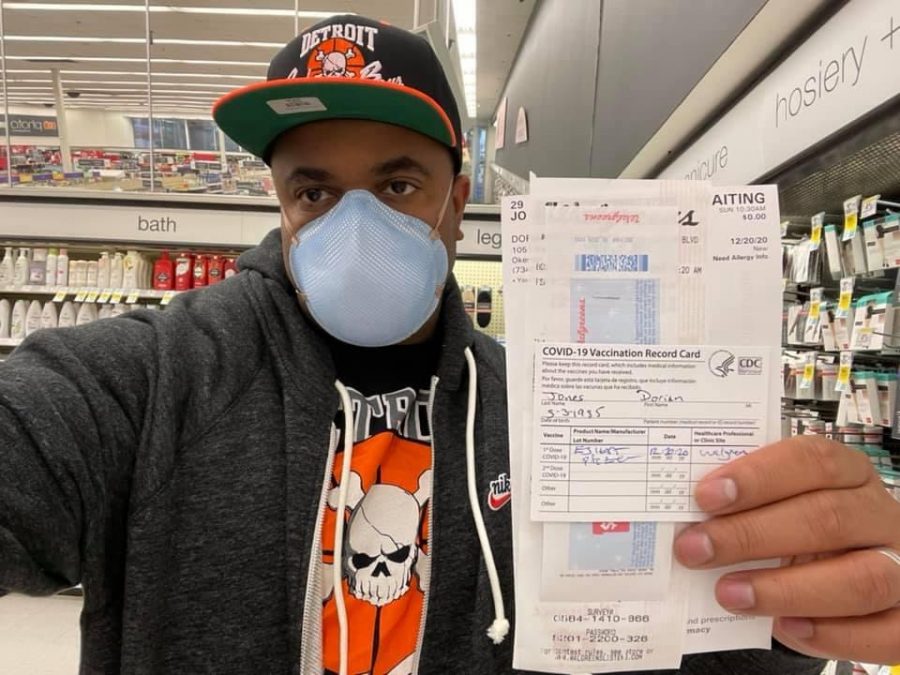Doctor’s COVID-19 vaccine review and recommendation
Photo Courtesy of Dorian Jones
Jones holds the documentation from the first round of his COVID-19 vaccination at a Walgreen’s store. He returned to the Walgreen’s for his second dosage Monday, Jan. 11.
After nearly a year of pandemic living, many Michigan residents are faced with the decision to take the COVID-19 vaccine — a “path back to normal life,” according to the state government.
Although returning to normalcy is a top priority in Michigan, receiving a COVID-19 vaccine is a new process. Dorian Jones M.D., husband of OU professor Rebecca Mercado-Jones, chose to take the Pfizer SARS-COV2 vaccine, and it was a “big sigh of relief.”
Vaccine options
There are two types of COVID-19 vaccines currently available — SARS-COV2 and mRNA-1273 vaccines. The SARS-COV2 vaccine is produced by Pfizer and BioNTach, and mRNA-1273 is produced by ModernaTX.
Both follow a similar patient process, requiring two vaccines. The SARS-COV2 vaccines are distributed 21 days apart, while the mRNA-1273 vaccines are given 28 days apart.
Once someone has received the vaccine, the Center for Disease Control and Prevention (CDC) noted recipients may notice chills, tiredness or headache from either vaccines for up to seven days after administration. Those should be the only side effects, aside from mild irritation at the vaccine site — pain, swelling or redness.
“My wife was kind of concerned about potential risks … and I didn’t have any side effects at all,” Jones said. “I didn’t have any soreness at all. I didn’t have fever or body aches.”
The CDC reports both vaccines are effective to everyone, unless someone has an allergy to a vaccine ingredient. Both vaccines are 94% to 95% effective at preventing COVID-19.
“It was pretty simple,” Jones said. “[I’m] looking forward to getting the next dose.”
Vaccination process
Because Jones is a medical doctor, he was given a priority vaccination time. Michigan is operating in phases to offer vaccines to people who are the most at risk or exposed to COVID-19. Michigan will enter its next vaccination phase on Jan. 11, which will include residents 65 years and older, frontline workers, childcare, pre-k through high school staff and care facility staff.
Although the vaccine is still early in its distribution phases, Jones said the process was “simple.”
First, he signed up for an appointment online with Walgreens and received a specific time to arrive. Then he went to a Walgreens store to get his first dose of the vaccine on Dec. 20.
“It’s just like any other vaccine,” Jones said. “They clean the site [and then] a very quick injection.”
Next Jones was instructed to wait 30 minutes to ensure he wouldn’t have an allergic reaction to the vaccine.
“In the meantime, I just shopped around Walgreens a little bit,” Jones said. “[After 30 minutes,] then I went home.”
His first vaccination process took just over 30 minutes, and he was allowed to immediately return home. To finish the dosage, he plans on returning to Walgreens for his second and last vaccine on Jan. 11.
Doctor’s recommendation
He recommends everyone who can safely receive a COVID-19 vaccine should get it, and then more people will feel “that relief when they finally have more protection.”
As a doctor, Jones can come into contact with around 20 people who have “experience or exposure” with the virus. His main concern was his personal risk and how it could affect his family.

“Hearing [COVID-19] stories for the past ten months now — this really weighed heavily on me … Even though, I felt pretty confident in the protective equipment I have [at work], there is still always the fear that maybe I wouldn’t be there at the dinner table at Christmastime this year,” Jones said.
Since his vaccination, Jones has recommended the vaccine to some of his patients, including patients on immunosuppression and who’ve received liver transplants. Although there are some side effects, “it’s certainly worth it.”
While the vaccine isn’t available to everyone yet, Jones predicts the vaccine will be open to everyone in roughly a month and recommends everyone safely receive a vaccine as soon as possible.
“No one’s life or no one’s job isn’t changed or altered by this virus … Everyone’s going through something, and we have to take care of each other in the meantime,” Jones said.












JoAnne Fink • Oct 5, 2023 at 2:55 PM
What a beautiful family & he’s an excellent Dr. He did my surgery in 2020, he was very patience & kind.
Alex Monroe • Feb 18, 2021 at 2:24 PM
Give that man a fucking cookie and a pat on the back